by Adelle M. Banks, RNS | Nov 4, 2021 | Black History, Headline News |
(RNS) — Two and a half centuries ago, Francis Asbury arrived in the United States from Great Britain, bringing with him what would become the Methodist faith. He went on to spread it across the country, with St. George’s Church in Philadelphia as his home base.
St. George’s will mark the occasion of Asbury’s arrival with a weekend of events at the end of October. But the historic church, which remains the oldest continually used Methodist building in the United States, is also the starting point of three African American churches and one denomination after a “walkout” by Black worshippers.
Over time, recounts the Rev. Mark Salvacion, St. George’s current pastor, African Americans —some recently freed from slavery — were segregated to the sides of the church, to the back of the building and to a balcony, preventing them from receiving Communion on the church’s main floor.
Salvacion describes this and other parts of St. George’s history in the church’s “Time Traveler” program for teen confirmation students learning about their faith and in classes of middle-age adults training to become certified lay ministers.
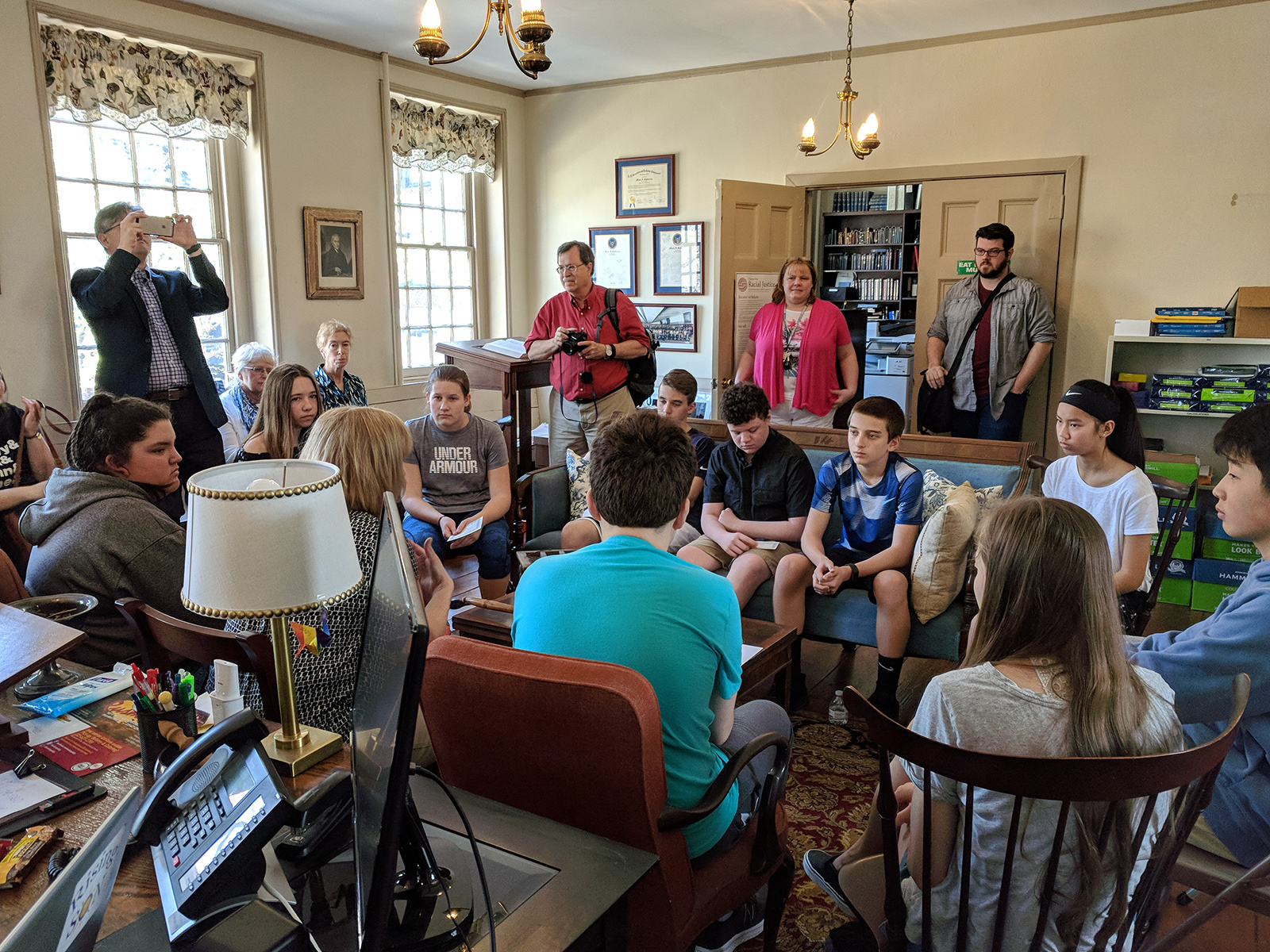
Teenage confirmation students attend a “Time Traveler” program at Historic St. George’s United Methodist Church in Philadelphia in 2018. Photo courtesy of HSG
“It’s not just telling happy stories about Francis Asbury itinerating to West Virginia,” said Salvacion, pastor of what is now called Historic St. George’s United Methodist Church. “It’s uncomfortable stories about race and the meaning of race in the United Methodist Church.”
The turning point for many African American worshippers, already dissatisfied with mistreatment, was a Sunday morning in the late 1700s. Lay preacher Richard Allen saw another Black church leader, Absalom Jones, forcibly pulled up while praying on his knees at St. George’s.
That led Allen and some of the other Black attendees to leave what was then known as St. George’s Methodist Episcopal Church and strike out on their own — in different ways.
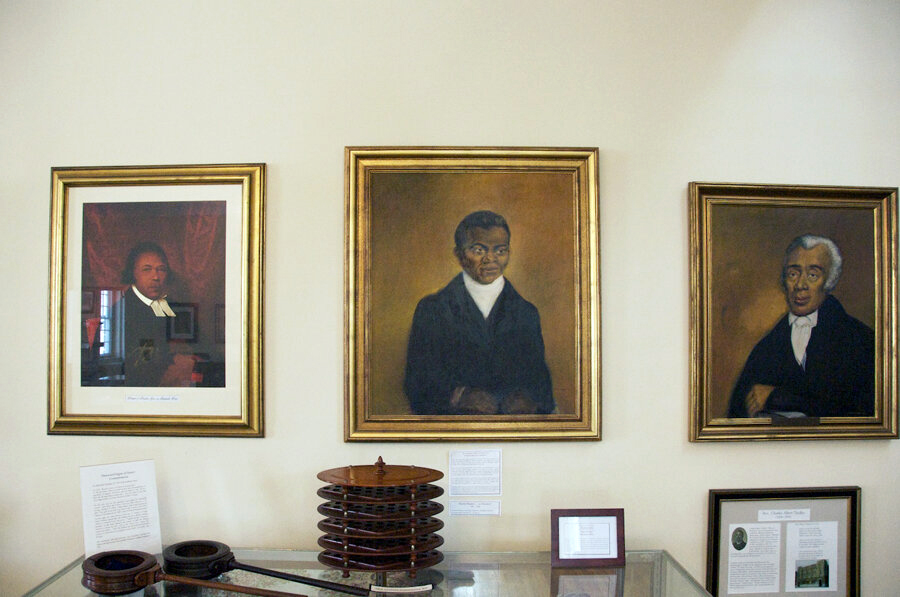
Portraits of Absalom Jones, from left, Harry Hosier and Richard Allen in Historic St. George’s United Methodist Church museum in Philadelphia. Photo courtesy of HSG
“This raised a great excitement and inquiry among the citizens, in so much that I believe they were ashamed of their conduct,” wrote Richard Allen in his autobiography. “But my dear Lord was with us, and we were filled with fresh vigour to get a house erected to worship God in.”
In 1791, Allen, who had been a popular preacher at St George’s 5 a.m. service, started what is now Mother Bethel African Methodist Episcopal Church. Asbury dedicated its first building, a former blacksmith shop, in 1794.
“Here’s Asbury and he comes in and he still has this kind of relationship with Richard Allen that is more than just collegial,” the Rev. Mark Tyler, current pastor of Mother Bethel, said of the men who were the first bishops of the Methodist and AME churches, respectively.
“I mean, you go out of your way as the representative and the saint of Methodism in America and you dedicate Mother Bethel. That is a statement that you’re behind this and endorsing it.”
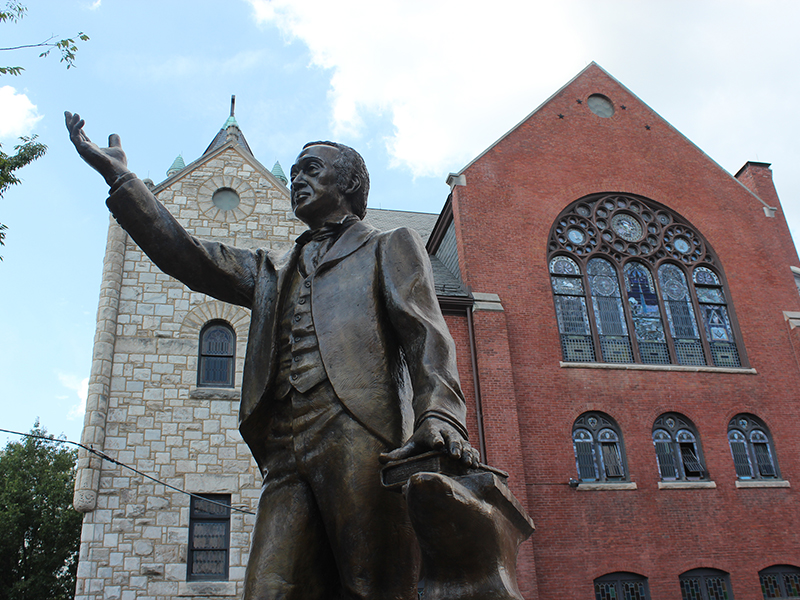
Bronze statue of Richard Allen, founder of the African Methodist Episcopal Church, on the property of Mother Bethel AME Church in Philadelphia on July 6, 2016. RNS photo by Adelle M. Banks
In 1816, after winning a court battle for its independence from the Methodist Episcopal Church, Allen started the African Methodist Episcopal Church, the nation’s first Black denomination.
Jones went on to serve as a lay leader of the African Church that began in 1792. Two years later, the congregation became affiliated with the Episcopal Church and was renamed the African Episcopal Church of St. Thomas. Jones was ordained a deacon in 1795 and a priest in 1802.
Arthur Sudler, director of the Historical Society & Archives at the 1,000-member church, said the 250th anniversary of Asbury’s U.S. arrival is significant not only for the three Philadelphia congregations that began after discord with St. George’s but also for the city and the three denominations they now represent.
“It’s an epochal moment simply because Francis Asbury’s role in helping develop Methodism in America, in part through his participation there at St. George’s, is one of those factors that gave birth to the Black Christian experience in Philadelphia,” he said. “And in America more broadly, because of the seminal role of Absalom Jones, Richard Allen, and Harry Hosier and their connections between what became these three denominations, the AME Church, the United Methodist Church and the Episcopal Church.”
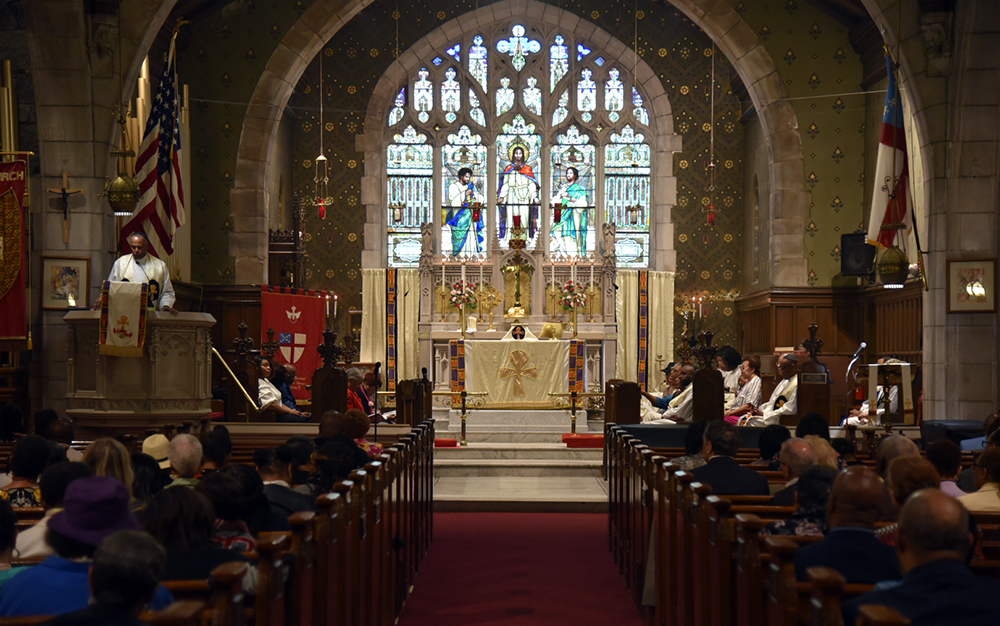
Service at the African Episcopal Church of St. Thomas in 2019. Photo by Dale Williams for D’Zighner Studios
Hosier initially stayed at St. George’s with other Black attenders who did not leave with Jones and Allen. He also was a closer colleague to Asbury than the other two men, having been a traveling companion who preached with the Methodist leader across the South. Allen, a free man, had declined the offer, avoiding a risky return to the region of the country where slavery remained legal.
Hosier helped found another Philadelphia Methodist congregation, which initially met in people’s homes and eventually became known as Mother African Zoar United Methodist Church. Asbury dedicated its building in 1796 and preached there a number of times, according to the United Methodist Church’s General Commission on Archives and History.
After it celebrated its 225th anniversary, Mother Zoar retained its name but merged with New Vision United Methodist Church in north Philadelphia, with a current average of 75 people at in-person worship services. It thus remains the oldest Black congregation in the United Methodist tradition in continuous existence.
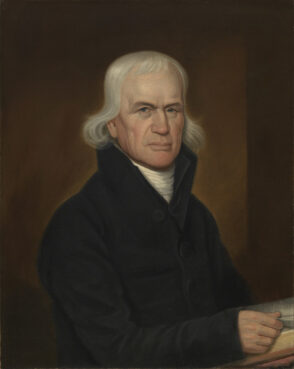
Portrait of Francis Asbury in 1813 by John Paradise. Image courtesy of National Portrait Gallery/Creative Commons
Given the steps of Allen and Jones, why did Hosier and other Black worshippers who once prayed at St. George’s remain within the Methodist Church?
“That is a million-dollar question,” said the Rev. William Brawner, the part-time pastor of Mother Zoar.
He said he assumes “those who left with Absalom, those who left with Richard were tired and figured that they could not change the system of injustice from the inside.” The founders of Zoar chose a different approach, hoping that remaining Methodist would help “change the hearts and minds of the people that were literally oppressing them.”
All these years later, Brawner said he does not judge the different decisions made by African American worshippers at St. George’s, who were unable to freely use spiritual practices that were different from those of white congregants and reflected beliefs some had brought with them from Africa.
“I think people left because of feeling uncomfortable and unaccepted in one place,” he said. “So the split could be celebrated now because of what has become of the split, but people didn’t split out of privilege. People split out of pain. They split because they were hurting.”
The emotions arising from the divisions transcended the centuries.
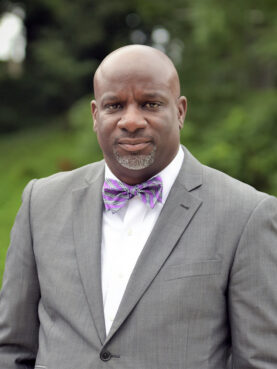
The Rev. Mark Tyler. Courtesy photo
Tyler, whose church has more than 700 members today, recalled the 2009 service when congregants of Mother Bethel worshipped at St. George’s for what was believed to be the first joint Sunday morning service since the 1700s. As the preacher for that day, he said the gathering was a “cathartic moment,” prompting many of his church’s members to weep.
Salvacion and the clergy of the other churches say occasional joint gatherings have continued since then, such as some of the congregations sharing Easter sunrise services and the annual Episcopal Church observance honoring Absalom Jones.
St. George’s currently has about 15-20 worshippers and a membership of about 50. It expects dozens of United Methodists and invited guests from other churches to attend the Oct. 30-31 commemoration.
Its pastor also expects exchanges and shared events will continue in the future among the congregations whose first members left his church building.
“We all view this history as being common history that we share,” said Salvacion, an Asian man who is one of St. George’s first pastors of color.
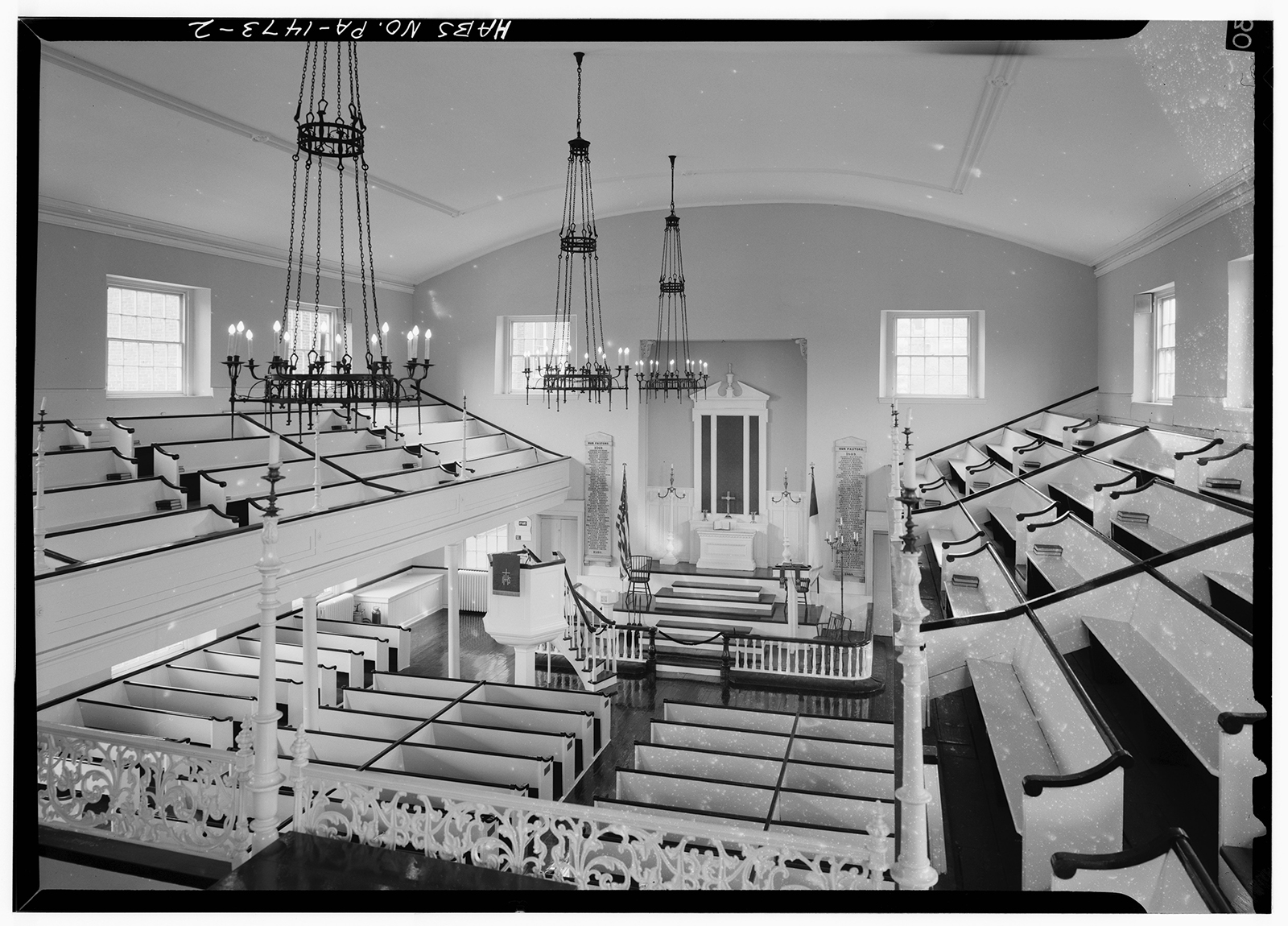
Interior of Historic St. George’s United Methodist Church in Philadelphia. Photo courtesy of LOC/Creative Commons
Tyler said the ongoing connections between St. George’s and Mother Bethel probably weren’t envisioned by anyone two centuries ago.
“The current relationship of these two congregations is, in some ways, a sign of hope for what’s possible,” he said. “If it can happen in these two congregations maybe it’s possible for us as a country and as a world. I have to take it for what it is — just a small sign of hope, in spite of all the kind of guarded optimism that I have.”
by Adelle M. Banks, RNS | Nov 2, 2021 | Headline News |
(RNS) — Sen. Raphael Warnock, who continues to pastor his historic Atlanta church while serving as Georgia’s first Black U.S. senator, has received the Roosevelt Institute’s Freedom of Worship Award in a ceremony focused on racial justice.
“I really felt that the strength of his pastoral voice was unique,” Anne Roosevelt, granddaughter of President Franklin Delano Roosevelt and board chair of the institute, told Religion News Service hours before Warnock was honored in a Wednesday (Oct. 13) ceremony.
“And now, he’s in this new role in addition to his role as pastor at the church, but his voice is consistently counseling, teaching, making himself vulnerable in order to help the rest of us make sense of the world,” she said.
Warnock, the pastor of Ebenezer Baptist Church, where the Rev. Martin Luther King Jr. was once co-pastor, was honored on the same evening with New York Times journalist Nikole Hannah-Jones. She was awarded the institute’s Freedom of Speech and Expression Award after spearheading the newspaper’s 1619 Project that explored the history and legacy of slavery in the U.S.
The senator, interviewed during the virtual ceremony by Community Change President Dorian Warren, said he views himself as a “pastor in the Senate,” reminding the powerful not to ignore people with no wealth.
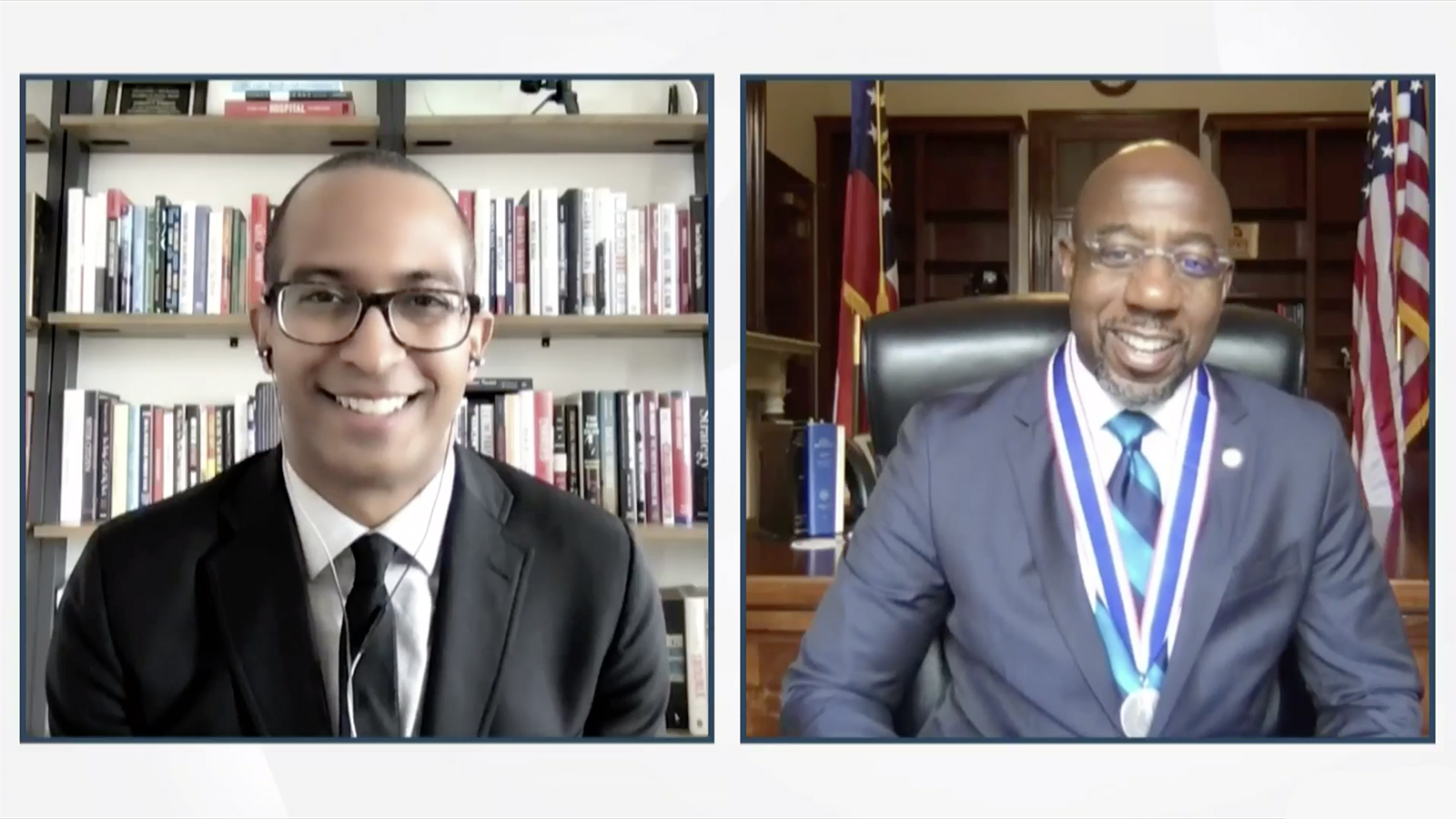
Dorian Warren, left, interviews Sen. Raphael Warnock during the Roosevelt Institute’s Four Freedoms Awards, Wednesday, Oct. 13, 2021, in a virtual ceremony. Video screengrab
“For me, faith gets engaged in the messiness of worldly struggle; it’s not hidden behind stained-glass windows,” Warnock said. “You probably could step over (the poor) but you shouldn’t. God warns us not to do that. My work is putting them always at the center. Because in their faces we see the face of God.”
The respective names of the Four Freedoms Awards are taken from fundamental liberties laid out in a 1941 speech to Congress by Franklin D. Roosevelt, who was elected to four terms in the Oval Office. He spoke of the “freedom of every person to worship God in his own way — everywhere in the world.”
His granddaughter, 73, said the institute, which has published reports and fact sheets on racial inequities, chose to take an “extra step” toward racial justice through this year’s awards.
“This is one event where we could say, ‘So what does it mean to be an anti-racist giver of awards?’” she said. “And to challenge ourselves and bring it to our own consciousness.”
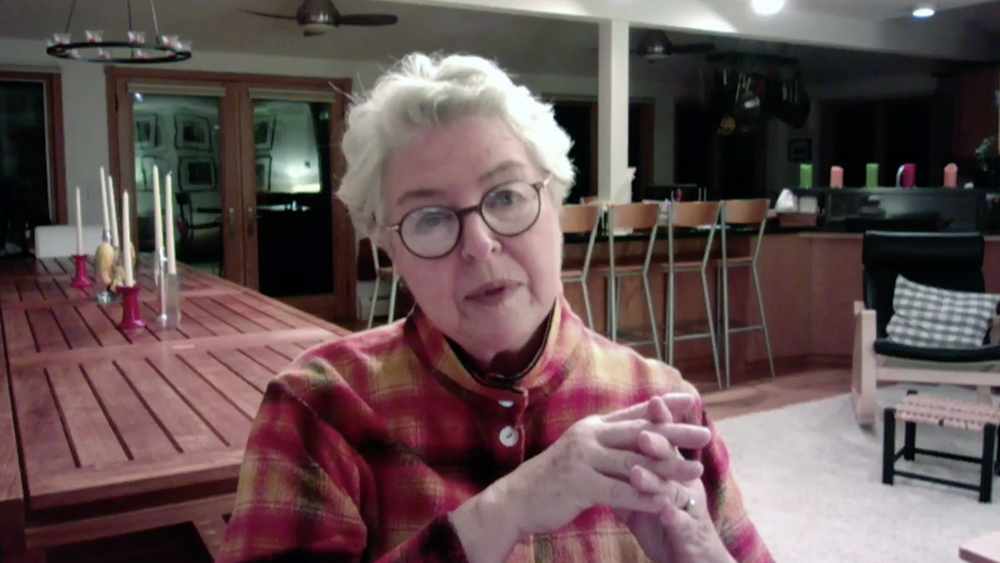
Anne Roosevelt opens the Roosevelt Institute’s Four Freedoms Awards virtual ceremony, Wednesday, Oct. 13, 2021. Video screengrab
Anne Roosevelt acknowledged that African Americans and other people of color were often left out of her grandfather’s New Deal reforms.
“We are still falling short of making sure that we deliver the same benefits of our democracy to every person in our country,” she said.
While Anne Roosevelt’s grandfather and grandmother, Eleanor Roosevelt, were lifelong Episcopalians, she said she was raised Catholic and is not currently affiliated with a denomination. But as a member of the committee that nominated Warnock for his award, she said she appreciates him as a leader and as a person of faith.
“I don’t often reflect on Jesus, but when I do, I picture him being surrounded by the people who followed him,” she said. “He taught them how to live, how to live as the fullest and best expression of humanity. And I feel like Senator Warnock is in that mode.”
by Caroline Sumlin, Urban Faith Contributing Writer | Oct 25, 2021 | Headline News, Relationships |

You never do anything nice for me!
When is the last time you bought me a gift?!
You never spend time with me anymore!
Do any of these phrases sound familiar to you? Perhaps they bring back a memory of an argument you and your significant other recently had?
The argument begins with something small, escalates into a blame game, and before you know it, you don’t remember what you were originally arguing about. I will be the first to say that I have been down this road many times. And, as a seasoned traveler of this road, I am here to tell you that no one feels good after these arguments.
Everyone sometimes feels hurt, confused, and worthless, like they are not good enough for their partner, like they deserve better, or whatever other unhappy feeling you want to “insert here.” Nobody wins.
As humans, we are selfish by nature. We are born selfish. In fact, selflessness is a trait that we have to learn over time. Naturally, we think “me, me, me.”
“What do I need? What do I want?”
This way of thinking transfers over into our relationships if we aren’t careful. We begin to think about whether or not our spouse has met our needs, instead of thinking about how we can meet their needs. And, if we think our needs haven’t been met, we feel it is our duty to tell our spouse about how they aren’t meeting our needs and that they should “do better.”
This may result in myriad reactions: your spouse becomes defensive, your spouse spits back what needs of theirs you aren’t meeting as well, your spouse feels worthless, your spouse shuts down, or your spouse apologizes and actually “does better.”
Unfortunately, the latter is less likely to happen. What is likely to happen is an argument that escalates quickly – leading to both parties feeling hurt, angry, or even resentful.
The heart of the godly thinks carefully before speaking; the mouth of the wicked overflows with evil words ( Proverbs 15:28).
I imagine that if you and I were sitting down to a cup of coffee and I were sharing this with you, you would respond with, “But, you don’t understand my wife/husband! They don’t do (insert complaint here)! I need to tell them how they aren’t treating me the way I deserve to be treated!”
I would respond by asking the following: “Is telling your partner about themselves helping anything? No? Well, have you prayed about it, instead?”
Pause.
Pray about it? Yes, pray about it. God calls us to be bringers of peace to our relationships and to avoid conflict. Remember that the power of life and death are in the tongue (Proverbs 18:21).
Every time we are complaining about our partners, we are speaking death to our relationships. We have the power to bring life to our relationships with our tongues instead. We can do this through prayer and by speaking direct words of affirmation over our significant others.
Next time you are tempted to tell your spouse what they “need to do” for you, try affirming them in that very area you feel as though they are lacking.
For example, instead of saying, “You never take it upon yourself to do the laundry. Why can’t you do more to help out around here?” Say, “Thank you so much for all that you do to keep our house in order. I appreciate you!”
Those powerful words just spoke the actions into your spouse that you wish to see more often. Then, in your private prayer time, ask The Lord to show your partner how important it is to you that he or she pitch in around the house.
God cares about the small details. And, He will honor you for coming to Him instead of igniting a quarrel in the relationship.
After praying, serve. Serve your spouse. Remember, that is what God calls us to do in our marriage. Marriage is just two people who are servants in love.
If you are wondering how you are supposed to serve your spouse, it is written right here in Colossians 3:18-19:
Wives, submit yourselves to your husbands, as is fitting with the Lord. Husbands, love your wives and do not be harsh with them.
When you serve your spouse, you fill them up with the love of the Holy Spirit. When we are filled with the love of the Holy Spirit, we are filled with the fruits of the Spirit, and when we are filled with the fruits of the Spirit, our relationships will result in less conflict.
Friends, marriage and relationships are hard work. It takes hard work to decide to be selfless every day. It takes hard work to serve your spouse when it is very possible that your own needs haven’t been met.
It takes work to pray for your spouse when you’re in the heat of an argument. It takes work to choose NOT to say something the next time you feel frustrated or conflicted. But, that work is so worth it. Take it from someone who’s been there.
I used to choose the selfish route. Now, I choose the selfless route. And, as a result, I am more in love with my husband today than I was when I married him.
by James Alexander, Jr. | Oct 8, 2021 | Faith & Work, Headline News |
In church, we often hear people make reference to “being a good steward over what God has given us.” But do we really know what that means?
Many would argue that the Bible talks more about money and stewardship than almost anything else. That suggests to us that what God has to say about money is pretty important.
Yes, there are more ways of practicing stewardship than ways that involve money, but money is what people struggle with most. Let’s address God’s posture toward our finances this particular article—we’ll save parts II and III on personal finance tips and church finances for another time.
First, many Christians have an incorrect biblical understanding about money. I can’t tell you how many times I’ve simply mentioned money and a Christian said, “Don’t talk to me about money. You know the Bible says that money is the root of all evil!” Well… no, it doesn’t. First Timothy 6:10 says that “the LOVE of money is the root of all [kinds of] evil.” And that makes a big difference. Money itself isn’t evil. Money is necessary. It’s the love of money that makes people do evil things to acquire more money. Essentially, the Bible is warning us not to make money our idol or god. If Christians spend their time avoiding money conversations, how can we expect to acquire any money or manage the money we have well?
So how does the Bible say we should manage money? Luckily, Jesus gives us a parable (a short story that makes a point) about managing money! But it might not be quite what you realized when you heard it in Sunday School or heard it preached…
Matthew 25:14–30 and Luke 19:12–28 are parables about financial investment that Jesus tells to illustrate what the kingdom of God is like. Yes, you read that right. Jesus tells a story about stewardship and managing currency (fittingly called “talents,” making it translatable to non-monetary gifts as well) to illustrate what God’s rule is like. The stories have some minor differences, so I’ll stick with the more popular version in Matthew 25.
 Briefly, the story goes like this: a man has three people that work for him. (We can call them servants or employees.) He leaves them five talents, two talents, and one talent, respectively, while he travels to another country. (A talent could be interpreted as a way of making money or money itself. For this, let’s just say a talent is worth $10,000.) When he comes back after a long time, the first employee now has ten talents ($100,000), the second has four talents ($40,000), and the last one gives his talent ($10,000) back to his employer. The employer rewards the two servants that made him money, but calls the other one wicked and “cast[s] the unprofitable servant into outer darkness” where it says there’ll be “weeping and gnashing of teeth” (Matthew 25:30, KJV). Yeah… he sends the unprofitable “wicked” servant to (symbolic) hell.
Briefly, the story goes like this: a man has three people that work for him. (We can call them servants or employees.) He leaves them five talents, two talents, and one talent, respectively, while he travels to another country. (A talent could be interpreted as a way of making money or money itself. For this, let’s just say a talent is worth $10,000.) When he comes back after a long time, the first employee now has ten talents ($100,000), the second has four talents ($40,000), and the last one gives his talent ($10,000) back to his employer. The employer rewards the two servants that made him money, but calls the other one wicked and “cast[s] the unprofitable servant into outer darkness” where it says there’ll be “weeping and gnashing of teeth” (Matthew 25:30, KJV). Yeah… he sends the unprofitable “wicked” servant to (symbolic) hell.
Whoa! That’s what the kingdom of God is like? According to Jesus—yep. But let’s unpack what this story is trying to tell us. It’s not saying that if we don’t make money (for God or ourselves), we’re going to hell. It’s something much more subtle and fundamental. So here are the three reasons the employer (who presumably represents God in this parable) is upset and what God is trying to tell us.
1. “Talents” lose value over time unless you grow them.
One of the first things that any good finance class will teach you is the time value of money, which simply means that money today is worth more than the same amount in the future. For some, this concept can be hard to understand, but trust me, it’s true. Money today can be invested sooner and gain more interest, so it is always worth more if used. And that’s before we consider inflation. In telling the story, Jesus is pointing out that the talents/money/earning potential that the master gave the servants was a gift that the master expected to be used for his benefit. (Sound familiar?) Jesus is clearly indicating that humans are God’s servants and that He expects us to use our talents (monetary and non-monetary) to His benefit. (The text doesn’t say “after a long time” he “settled accounts with them” for no reason; it’s symbolic of our lifetimes (Matthew 25:19, NIV).)
2. The servant wastes the talent that the master gave him.
I did say it’s only worth more if used. That’s why the Lord was so upset—the servant didn’t use the talent he was given. That means he not only wasted the talent itself (because it is worth less now than it was when he gave it to him), but also wasted all of that time that he had the talent. Imagine how much that single talent could have grown and been enhanced, but by hiding it instead of using it, he robbed it of its value. Unfortunately, some of us are guilty of doing the same thing with God because, like the servant in the stories, we’re afraid of messing up with the talent we have. This story warns us that the way to really mess up is to hide our talents and money out of fear and not utilize them for God’s glory
3. The servant/employee doesn’t put in any effort.
The biggest tragedy of this parable is that it didn’t have to end up that way for the third servant. The master points out that even if he feared him, hiding his talent (i.e., putting his money under a mattress) was the worst thing he could’ve done with it. He says, “You could have at least put my money in the bank so that it could have gained interest!” (Credit unions are also a great option these days.) This suggestion serves to tell us that even a little growth is better than no growth. Yet for some reason, many Christians think that as long as we present God with what He gave us, we’ll be fine. Not so. If we don’t help grow God’s kingdom, even a little bit, then it is as if He had not given us any gifts or talents to begin with. Putting the money in the bank was something simple that did not take much effort; how often do we not put in the effort to speak with someone about God or to pay our tithes and give our offerings? When we don’t put in the effort required to grow what God has given us, we are being the wicked servant Jesus warned us about.
In conclusion, many Christians erroneously believe that if they had more money, they would do better with it. Others say that when they make more money, they’ll pay their tithes, yet when a raise comes, they simply spend more money and never tithe. Based on the Scripture, if we did a better job of managing the little that we had, not only would we have more as a result of our good stewardship, but God would bless us with more. This is what I believe Jesus means when He says, “For whoever has will be given more … Whoever does not have, even what they have will be taken from them” (Matthew 25:29, NIV). To God, if we don’t put forth the effort to grow a little, then we won’t have the “talent,” skill, or practice needed to manage something greater.
by T-Kea Blackman | Sep 9, 2021 | Headline News |
Video Courtesy of AJ+
“Black people don’t commit suicide. That’s a white thing.”
Who said that? That is a false statement. Blacks suffer from mental illness just like their white counterparts. In fact, when you think of everyday stressors, systematic-racism such as police brutality, education and health care gaps, and sexism that impacts black women, blacks are more likely to be at risk for developing a mental condition.
Although July is Minority Mental Health Awareness Month, this week, September 5-11 is National Suicide Prevention Week and it is a perfect time to shed light on what many deem a nonexistent problem. Schizophrenia, post-traumatic stress disorder, bipolar disorder, major depression, generalized anxiety disorder, dissociative identity disorder/multiple personality disorder, bulimia, ADHD, OCD and social anxiety are examples of mental illnesses that people battle daily. In the black community, many choose not to acknowledge mental illness as a sickness. Diseases such as diabetes and cancer are accepted as normal and natural, but what so many fail to realize is that blacks are no different than any other race when it comes to these illnesses. We are not exempt from mental illness.
While some experience mental illness only once in their life (depending on the illness, environment, life stressors, and genetics), others battle mental illness for the rest of their lives. Some of us think that we do not have a problem and truly believe that everyone else is the issue. Unfortunately, these myths and illusions force us to suffer in silence and not seek treatment. Mental illness affects “everyday functional” people and it is not limited to the homeless man talking to himself. It impacts a person’s emotions, perception, and behaviors.
As a person with major depression and generalized anxiety disorders, the comments said to me have been heartbreaking and mind-blowing because it prevented me from seeking help. I thought that I was making it up in my head even though I didn’t feel well for years. Finally diagnosed at 25, my doctor stated that the illness started around the age of 13. Can you imagine having cancer without being diagnosed for over 10 years? You would die. Well, I can tell you that I was dying on the inside and it led to multiple suicide attempts. My illness can get so debilitating. At one point, it stopped me from doing basic things such as going to work, talking, eating and showering.
Here are some of the myths that we must stop saying!
Myth #1: Only white people commit suicide.
Fact: According to by the Centers for Disease Control and Prevention, the suicide rate of black children in between the ages of 5 and 11 doubled between 1993 and 2013 and the rate among white children committing suicide declined. Suicides by hanging nearly tripled among black boys. While whites still have highest suicide rates in the country, suicide rates among black youth have significantly grown over the past decade. Unfortunately, black youth are killing themselves more frequently than their elders. Suicide has become the third leading cause of death among black people between the ages of 15 and 24 and a leading cause of death among school-aged children younger than 12 years in the United States.
Myth #2: Medication doesn’t work and/or they make you feel worse.
Fact: Medication is necessary for some individuals in their mental recovery. While they are NOT cures for mental illness, they are vital for treating the symptoms. Some may need medication for the rest of their lives (depending on the illness) and others only need it for a specific time. Nonetheless, medication is not a sign of weakness and it does not mean the person is crazy. It is no different from taking medication for high blood pressure or insulin for diabetes. Just like the body gets sick, the brain gets sick too, if you don’t take care of it. And no, this is not to say that everyone with a mental illness will need medication, but it is an invaluable help to many.
Myth #3: Black people don’t go to therapy.
Fact: Though there has been a deep-rooted stigma about seeking therapy, Blacks are increasingly seeking therapy for mental illness. Therapy is great whether you have a mental illness or not. Therapy helps you to work on yourself, dissect problems, face fears and overcome obstacles such as breakups, loss of a loved one, financial challenges, self-image issues, abuse, etc. As mentioned previously, blacks deal with oppression daily and therapy can help us work through it. Those who are still hesitant to try therapy can look into other ways of getting help. The support of a life coach has also been shown to be beneficial for many.
Myth #4: You can pray it away.
Fact: As a Christian, I have seen God perform miracles in my life. But when you say to a person “just pray,” you are assuming that they are not praying and dismissing how they feel, challenging the sincerity of their faith, and most likely preventing them from getting treatment. You would not say “just pray” to a person who broke a leg. You would tell them to go to the doctor for an x-ray and cast. We must treat mental illness the same. God also gives us resources to use on earth and sometimes that may be therapy and medication when a person is battling a mental illness.
Damian Waters is a marriage and family therapist in Upper Marlboro, MD, where he serves predominantly African American clients. On the issue of the stigma surrounding blacks seeking therapy, he says, “There’s some shame and embarrassment. You’ll tell someone that you went to the doctor, but you won’t tell that you went to the counselor or psychiatrist. Also, there is the idea that their faith should carry them through, though often their problems are larger than that.”
As a way to honor those with mental illness, please think before you speak, and encourage those who need help to seek treatment. Mental illness is just as serious as any other disease and those affected by it should not be judged or outcast. Mental illness is a flaw in brain chemistry, not a character flaw, or a white people problem.
Can you think of other myths surrounding Blacks and mental illness? Share them below along with your thoughts on putting the myths to rest once and for all.











 Briefly, the story goes like this: a man has three people that work for him. (We can call them servants or employees.) He leaves them five talents, two talents, and one talent, respectively, while he travels to another country. (A talent could be interpreted as a way of making money or money itself. For this, let’s just say a talent is worth $10,000.) When he comes back after a long time, the first employee now has ten talents ($100,000), the second has four talents ($40,000), and the last one gives his talent ($10,000) back to his employer. The employer rewards the two servants that made him money, but calls the other one wicked and “cast[s] the unprofitable servant into outer darkness” where it says there’ll be “weeping and gnashing of teeth” (
Briefly, the story goes like this: a man has three people that work for him. (We can call them servants or employees.) He leaves them five talents, two talents, and one talent, respectively, while he travels to another country. (A talent could be interpreted as a way of making money or money itself. For this, let’s just say a talent is worth $10,000.) When he comes back after a long time, the first employee now has ten talents ($100,000), the second has four talents ($40,000), and the last one gives his talent ($10,000) back to his employer. The employer rewards the two servants that made him money, but calls the other one wicked and “cast[s] the unprofitable servant into outer darkness” where it says there’ll be “weeping and gnashing of teeth” (